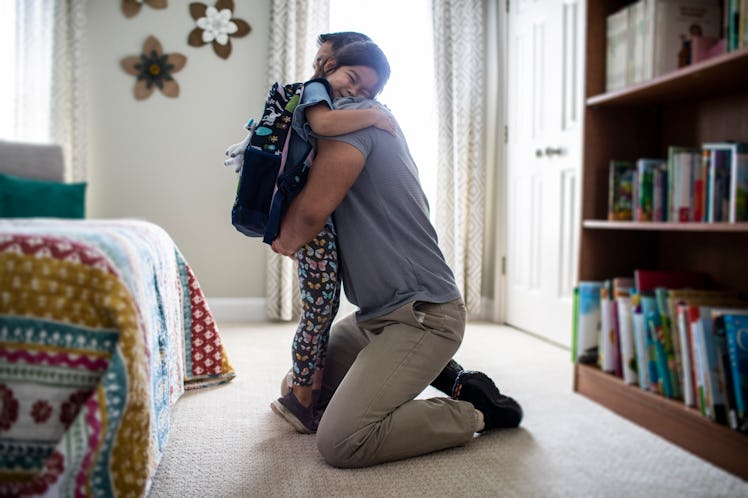When Do Childhood Memories Start? Earlier Than You Might Think
Toddlers may not recall the specifics of a family trip or special event, but they carry the emotional content of those adventures through life.

When do memories start? One of the great joys of parenthood is introducing your kid to the world and giving them a foundation of good childhood memories on which they can start building their life. A major way that parents try to build memories is through adventures. Travel is easy enough when they’re infants (a baby is basically carry-on luggage that occasionally cries), but it gets trickier by the time they’re toddlers. Because hitting the road with a preschooler requires NASA-level strategic planning, many parents simply stay put, resigned to the fact that very young kids have childhood amnesia and won’t remember anyway. But building up a healthy reserve of future nostalgia with your kids is always a good investment.
You may have heard that children don’t form memories until about age 3, but that’s a bit of an oversimplification. According to a pair of leading experts in childhood memory, your 2-year-old may not recall their first spin on the teacups like you will (how could you forget that face?). But they will retain a different, more mysterious kind of memory — one that lasts a lifetime.
Kids Remember Differently Than Adults Do
Adults might think of memories in categorical terms, like “Remember that great restaurant we went to on our honeymoon?” or “Did I forget our anniversary?” But according to Nora Newcombe, Ph.D., a psychology professor at Temple University and co-director of the Infant & Child Laboratory, memory is more than a mental picture. “One of the big contributions of psychology and neuroscience over the past few decades is to unpack memories into different categories.”
The two categories, Newcombe explains, are explicit memory and implicit memory. Both are subdivisions of long-term memory and begin developing very early. Here’s how they differ:
- Explicit Memory: Requires conscious recall and is generally associated with a time and a place — the autobiographical version of memory you’re used to.
- Implicit Memory: Not about specific events, but instead is more of an unconscious, emotional recollection.
Your kids’ memories of the pancakes you made for them on Saturdays? Explicit. The warm, fuzzy feelings whenever they pass an IHOP? Implicit. Your ability to remember what you had for breakfast this morning? Questionable.
What Is Childhood Amnesia?
Kids begin forming explicit childhood memories around the 2-year mark, but the majority are still implicit memories until they’re about 7. It’s what researchers, like Carole Peterson, Ph.D., from Canada’s Memorial University of Newfoundland, call “childhood amnesia.”
She says that age 3, or about preschool age, is the turning point when explicit memories begin to get more frequent, detailed, and adult-like. By age 6 or 7, your kid’s memory is similar to yours. (So, maybe your 8-year-old can help you remember what you ate for breakfast this morning?)
Form Collective Family Memories
Your kid, thankfully, won’t remember their birth. But if you keep bringing up that story about how you raced their mom to the hospital in the worst blizzard of the century, they’ll have a memory of the event as if they white-knuckled the drive beside you. “It becomes part of their memory, too,” Newcombe says. “In some sense, this is a false memory because they didn’t experience it. But it’s a true memory because it did happen.”
In experiments, researchers have found that it’s possible to introduce false details into people’s memories. “It’s both good and bad that our memories are plastic,” Newcombe says. “We can incorporate new things, but we have to remember that our memories are fallible.” So, scrapbook responsibly.
Reinforce Good Childhood Memories
Almost no one has enough brain RAM to recall everything that happens in their lives. But, according to Peterson, memories that are suffused with emotion and fit into a greater context are more likely to form earlier and last longer.
You can help this process by talking to your kids about experiences from their lives. “Kids’ memories are more coherent when there’s a context of who, what, where, when, why, and how,” Peterson says. It turns out your folks were onto something with those vacation slideshows.
Practice Nostalgia With Your Kids
Childhood memory experts are beginning to think that parents talking a lot about the past plays a big role in the number of memories kids form and how early they form them. This may be especially true for fathers and sons.
Peterson conducted a study of parental influence on early memories that examined the effect of gender-specific parent-child combinations. In the experiment, young adults (ages 18-28) were asked to recall as many memories involving parents as they could from their preschool years (before age 6). “We found that when you had warm parents that spent a lot of time talking about the past, those males remembered more of early life, but also had memories from further back in their lives,” Peterson says. “And that’s particularly the case for fathers talking to sons.”
It Doesn’t Matter If Kids Remember
The next time you look at your preschooler and think, “They’ll never remember this,” you’re right — they probably won’t. But take comfort in the fact that just because they won’t have total recall of these formative years, they will remember the important things that make them better people: Parents take care of you, and the world is a good place.
So don’t judge an experience by whether or not your preschooler will cherish it forever. “If the kid has fun, even if they don’t remember the experience, that’s nothing to sneeze at in terms of forming a worldview that life can be enjoyable,” Newcombe says. “It sets a global expectation that the world is a nice place and people are good to me. These are the kinds of things people are building up in the early years.”
This article was originally published on